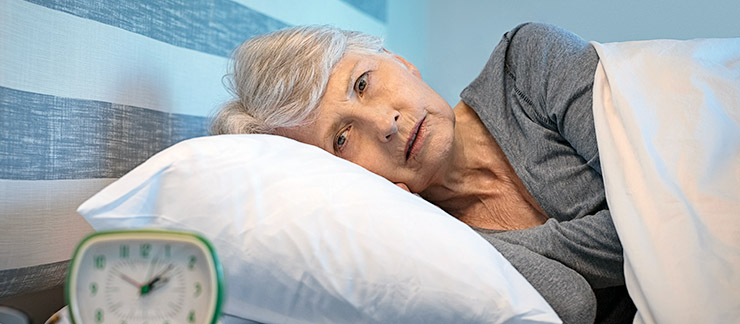
7 Tips to Support Seniors With Insomnia
Sleep is an integral part of healthy aging, but what happens if a senior loved one has difficulties getting a good night’s rest? While sleep patterns tend to change as individuals age, it’s important to discover if any physical, emotional, cognitive, or medicinal factors are causing the problem.
Insomnia, a disorder that causes persistent problems falling or staying asleep, is a common sleep issue among seniors. According to the Sleep Foundation, the following symptoms may indicate insomnia for seniors:
- Difficulty falling or staying asleep
- Waking up early constantly
- Resisting the need to go to bed at a reasonable time
- Inability to feel refreshed after waking up in the morning
- Having issues concentrating during the day
- Relying on pills to fall asleep
If a loved one experiences insomnia symptoms, schedule an appointment with a physician.
Ignoring insomnia can lead to daytime sleepiness and cause irritability, increased risk of falls and accidents, and reduced quality of life. Insomnia may also cause problems with metabolism, mental and cardiovascular health, immune system, and lung function.
In-Home Care Can Promote Healthy Sleep for Seniors
Although a physician will identify factors contributing to insomnia and recommend a treatment plan, an in-home personal caregiver can play a supportive role. Here are ways a professional caregiver can promote healthy sleep for seniors:
- Provide companionship
A Visiting Angels’ caregiver can offer companionship your senior needs to create a peaceful bedtime routine. Our caregivers offer overnight and 24/7 care, as well as a “turndown” service, to assist your loved one with preparing for bed. If your older adult becomes fearful, worried, or wakeful in the evening or during the night, a professional home caregiver can be a soothing, reassuring presence.
- Assist with dementia-related symptoms
Seniors with dementia may experience “sundowning,” which can cause increased confusion, anxiety, and agitation beginning at dusk and lasting throughout the night. Sundowning can sometimes result in nighttime wandering, pacing, disorientation, and restlessness. If your loved one needs dementia care, Visiting Angels can provide dedicated personal care and safe overnight supervision.
- Maintain healthy daytime routines
Shifts in daytime routines can affect quality of sleep at night. A Visiting Angels’ caregiver helps encourage restful sleep for seniors by maintaining familiar routines, such as going to bed and waking up at the same time, avoiding long afternoon naps, eating meals on a regular schedule, and getting regular exercise.
- Encourage good sleep habits before bedtime
Good sleep habits before bedtime can go a long way toward managing insomnia. For example, a Visiting Angels’ caregiver can limit exposure to artificial light before bedtime by encouraging your senior to turn off the television and engage in conversation or reading. A caregiver can also make sure your loved one’s bedroom is quiet, dark, and at a comfortable temperature.
- Provide medication reminders
A Visiting Angels caregiver will remind seniors to take their prescriptions at the scheduled time.
- Reduce the risk of a nighttime accident
In addition to dementia, other health conditions, such as Parkinson’s disease, stroke, heart failure, asthma, sleep apnea, diabetes, and urological or gastrointestinal disorders can cause insomnia.
If your senior needs to get out of bed to use the bathroom, get a drink, or take medication, they could be at a higher risk of a fall or accident if not supervised — particularly if they are also experiencing problems with mobility, eyesight, or cognitive functioning. A Visiting Angels’ caregiver can provide support during the night by minimizing awake time and helping to prevent accidents.
- Support a spouse or family member in the household
When a senior has sleep issues, it can keep everyone else in the household awake. Our caregivers can be there to assist your senior during the night, so other family members can get the rest they need, too.
If your older loved one is living with insomnia, our Visiting Angels caregivers can take steps to keep them safe, offer reassurance, and promote good sleep habits — while providing peace of mind for family members. Contact us today to schedule a free home care consultation.


